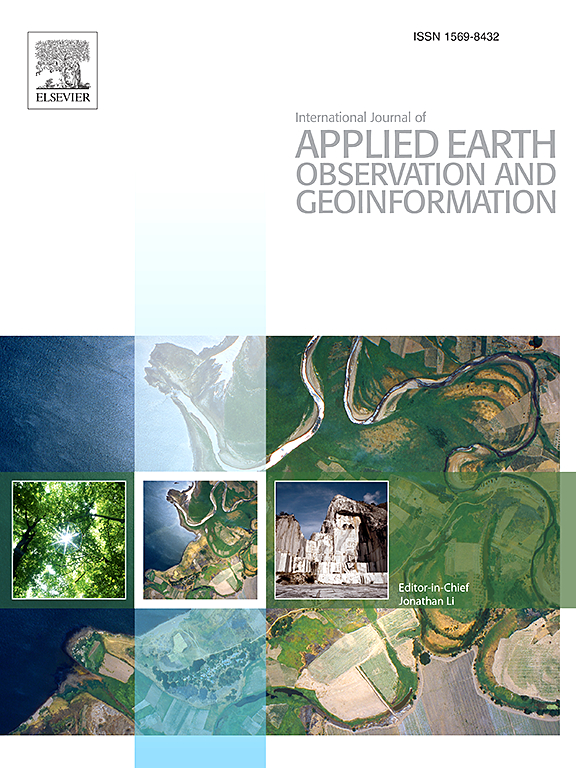Remotely geolocating static events observed by citizens using data collected by mobile devices
IF 7.6
Q1 REMOTE SENSING
International journal of applied earth observation and geoinformation : ITC journal
Pub Date : 2024-12-01
DOI:10.1016/j.jag.2024.104287
引用次数: 0
Abstract
The increasing use of smartphones has led to a surge in crowdsourcing initiatives, where citizens easily collect and upload information using advanced sensors, leveraging the collective efforts of the crowd. However, these devices face accuracy issues that must be addressed before they can be used effectively in certain applications. While most research has focused on GNSS-based positioning errors, compass-based orientation errors have received far less attention. This paper presents a novel method for determining the geolocation of static events by combining contributions from multiple volunteers located around a target event. Instead of straight lines, the method applies funnel-shaped regions to represent the azimuths toward the target location and encompasses various phases to address errors stemming from measured azimuths. These compass-based orientation errors have attracted less attention compared to GNSS-based positioning errors. The approach mitigates the uncertainty in azimuth measurements, producing a set of regions that contain the target location with different levels of confidence. Its reliability was tested in three case studies with known target locations, using metrics such as area and compactness. The results were promising, indicating that the developed approach is particularly useful in applications that do not require a high degree of accuracy (common in many crowdsourcing projects), such as the geolocation of forest fire ignitions − once in the vicinity they can be easily spotted. Implementing this approach within a system that collates citizens’ contributions can furnish invaluable information to authorities, empowering prompt action during emergency scenarios.
求助全文
约1分钟内获得全文
求助全文
来源期刊

International journal of applied earth observation and geoinformation : ITC journal
Global and Planetary Change, Management, Monitoring, Policy and Law, Earth-Surface Processes, Computers in Earth Sciences
CiteScore
12.00
自引率
0.00%
发文量
0
审稿时长
77 days
期刊介绍:
The International Journal of Applied Earth Observation and Geoinformation publishes original papers that utilize earth observation data for natural resource and environmental inventory and management. These data primarily originate from remote sensing platforms, including satellites and aircraft, supplemented by surface and subsurface measurements. Addressing natural resources such as forests, agricultural land, soils, and water, as well as environmental concerns like biodiversity, land degradation, and hazards, the journal explores conceptual and data-driven approaches. It covers geoinformation themes like capturing, databasing, visualization, interpretation, data quality, and spatial uncertainty.
 求助内容:
求助内容: 应助结果提醒方式:
应助结果提醒方式:


